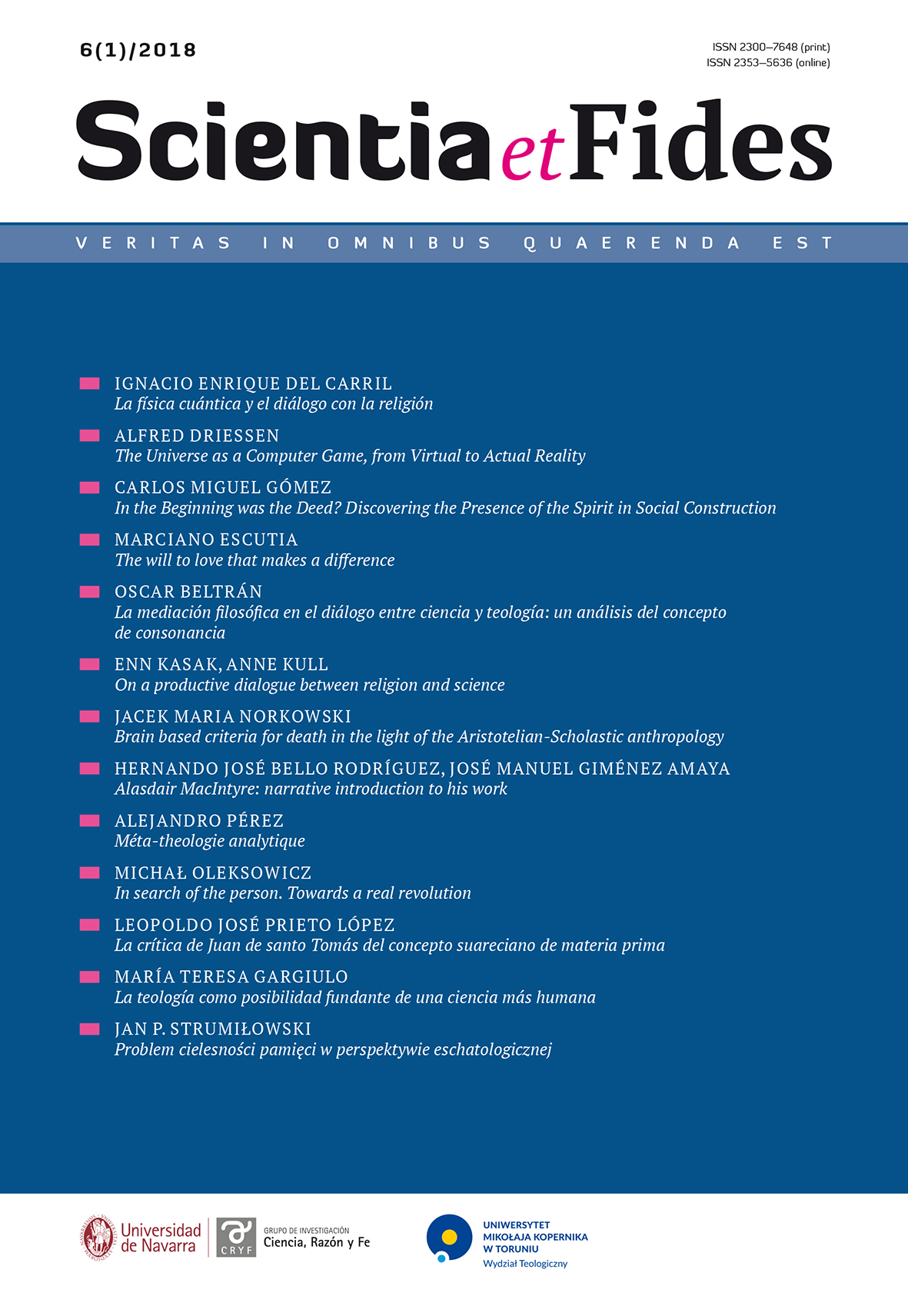On a productive dialogue between religion and science
Keywords
knowledge, Peirce, pragmaticism, realism, theologyAbstract
Searching for common ground in philosophy, science and theology, it seems to us that it would be reasonable to maintain the position of realistic pragmatism that Charles Sanders Peirce had called pragmaticism. In the pragmaticist manner, we typify the knowledge and select the types of knowledge that might be useful for understanding the problems that are of interest to us.
We pose a question of how it would be possible to obtain practically useful information about reality, first from the perspective of natural sciences, and then from that of theology; that is, to diversify the ways of knowledge and just maybe, to move toward a productive dialogue between science and religion.References
Anderson, Douglas R. 1995. Strands of System: The Philosophy of Charles Peirce. West Lafayette, Indiana: Purdue University Press.
Dworkin, Ronald. 1986. Law’s Empire. Cambridge, MA: Harvard University Press.
Gettier, Edmund L. 1963. “Is Justified True Belief Knowledge?” Analysis 23(6):121–23.
James, William. 1907.”Pragmatism’s Conception of Truth.” The Journal of Philosophy, Psychology and Scientific Methods 4(6):141– 55.
James, William. 2002. The Varieties of Religious Experience: A Study in Human Nature. Centenary edition, London and New York: Routledge.
Kant, Immanuel. 1968. Werke in zwölf Bänden. III. Kritik der reinen Vernunft I, Frankfurt am Main: Suhrkamp.
Kasak, Enn. 2011. “Unperceived Civil Religion in Science.” Problemos 80:94–106.
Kasak, Enn and Veede, Raul. 2016. “Understanding Knowledge through the Example of C. S. Peirce’s Cosmology.” Acta Baltica Historiae et Philosophiae Scientiarum 4(2):69–87.
http://www.bahps.org/acta-baltica/abhps-4-2
Nagel, Thomas. 2003. The Last Word. Oxford: Oxford University Press.
Oberst, Michael. 2015. “Kant on Universals.” History of Philosophy Quarterly, 32(4): 335–352.
Peirce, Charles Sanders. 1868. “Questions concerning Certain Faculties Claimed for Man.” The Journal of Speculative Philosophy 2:103-114.
Peirce, Charles Sanders. 1878. “How to Make Our Ideas Clear.” Popular Science Monthly 12: 286–302.
Peirce, Charles Sanders. 1902. “Paulsen's Kant.” The Nation 75, 209–11.
Peirce, Charles Sanders. 1908. “A Neglected Argument for the Reality of God.” The Hibbert Journal 7:90–112.
Peirce, Charles Sanders. 1994. The Collected Papers of Charles Sanders Peirce, edited by John Deely, Membra Ficte Disjecta: Electronic edition. (In text: CP).
Popper, Karl Raimund. 1968. “Epistemology Without a Knowing Subject.” In Logic, Methodology and Philosophy of Science III, edited by Bob Van Rootselaar and Johan F. Staal, 333–373. Amsterdam: North-Holland Publishing Company.
Popper, Karl Raimund. 1994. Objective Knowledge: An Evolutionary Approach. Oxford: Clarendon Press.
Pritchard, Duncan. 2009. Knowledge. London: Palgrave Macmillan.
Weinberg, Steven. 2003. Facing Up: Science and Its Cultural Adversaries. Cambridge, MA., London: Harvard University Press.
Wittgenstein, Ludwig. 2002. Tractatus Logico-Philosophicus. London and New York: Routledge.
Downloads
Published
How to Cite
Issue
Section
License
CC BY ND 4.0. The Creator/Contributor is the Licensor, who grants the Licensee a non-exclusive license to use the Work on the fields indicated in the License Agreement.
- The Licensor grants the Licensee a non-exclusive license to use the Work/related rights item specified in § 1 within the following fields: a) recording of Work/related rights item; b) reproduction (multiplication) of Work/related rights item in print and digital technology (e-book, audiobook); c) placing the copies of the multiplied Work/related rights item on the market; d) entering the Work/related rights item to computer memory; e) distribution of the work in electronic version in the open access form on the basis of Creative Commons license (CC BY-ND 3.0) via the digital platform of the Nicolaus Copernicus University Press and file repository of the Nicolaus Copernicus University.
- Usage of the recorded Work by the Licensee within the above fields is not restricted by time, numbers or territory.
- The Licensor grants the license for the Work/related rights item to the Licensee free of charge and for an unspecified period of time.
FULL TEXT License Agreement
Stats
Number of views and downloads: 1044
Number of citations: 2



